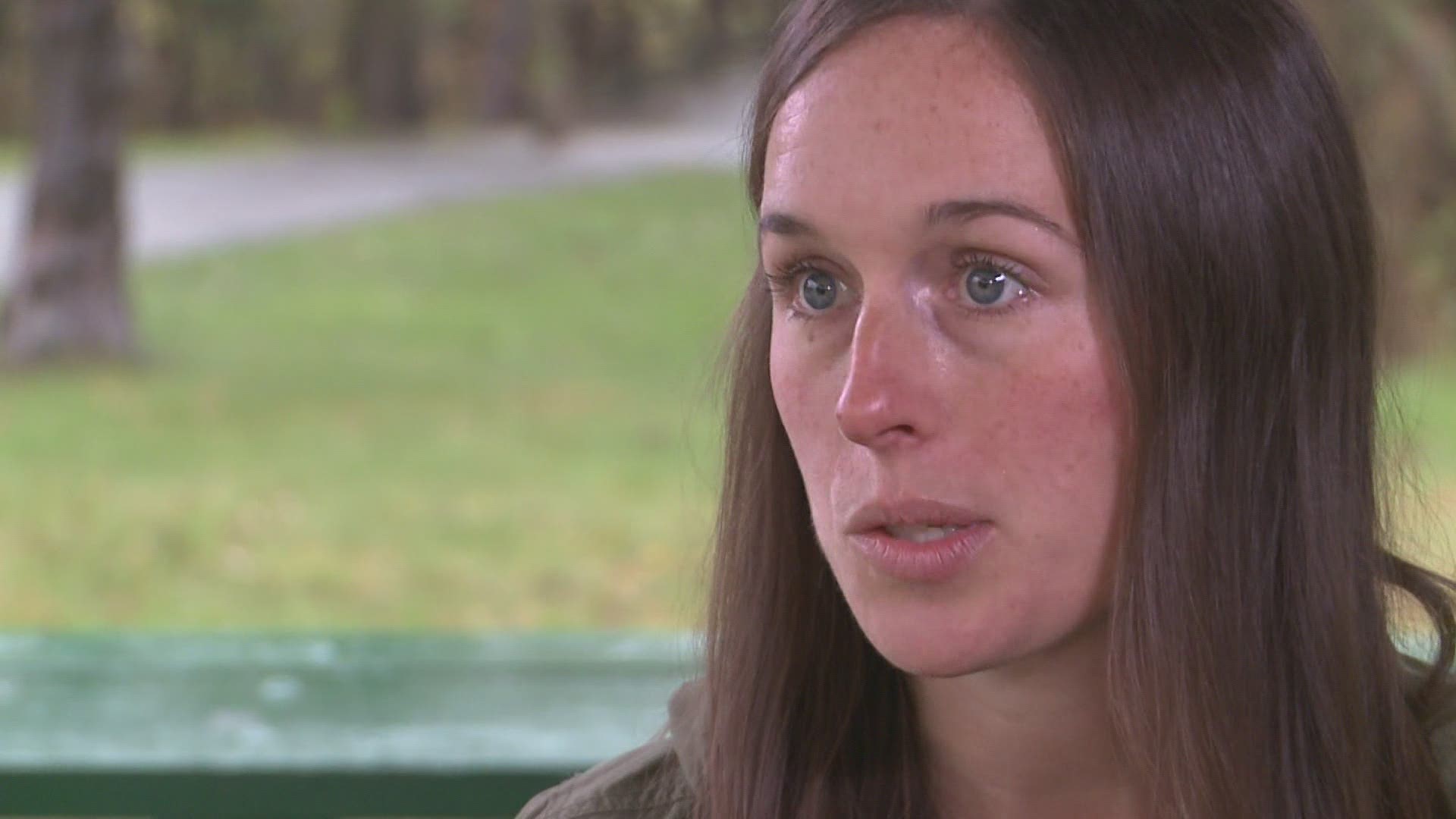GRAND RAPIDS, Mich. — The coronavirus pandemic has drastically changed the lives of millions of Americans, leaving people like Grand Rapids native Lindsey Dubey out of work.
“We are just nonstop slamming out concerts,” Dubey said. “15 to 18 hour days. I'm pretty much on seven days a week.”
As a production manager at 20 Monroe Live, Dubey went from being booked, to facing a months-long furlough.
“We're not coming back this summer, we're not coming back this fall, gosh, we might not be coming back this winter,” Dubey said.
In the music industry, where coworkers are like family, "not coming back" hits differently.
“Now they're facing some really harsh realities like, ‘Oh, I have some skeletons I got to work through right now,’” Dubey said.
Like tens of millions of other Americans, Dubey made a call.
“That gave me an opportunity to work with Anya, to just work through things that maybe had been pushed down because I had to, because I was just grinding,” Dubey said.
She began therapy sessions with Anya Nyson, LMSW, a psychotherapist at Spectrum Health.
"Loneliness is a big issue during the holidays,” Nyson said. “We do see an increase in anxiety, depression, loneliness, and with the isolation we're feeling now with COVID it's only amplified.”
Add a presidential election and family holiday plans, it can get pretty tenuous.
“Whether it's virtually or in person, there's an opportunity for a lot of strong emotions,” said Nyson.
Dubey said it’s something she herself has struggled with.
“I think it can be really difficult when you feel like you're an outcast in your own family, which is why a lot of us in the music industry, we find our own families,” Dubey said.
Dubey is far from alone.
“The problem is that we want, especially our family, to think and feel the same way and they don't,” Nyson said. “So we do have to accept that.”
Nyson suggests making rules to handle the holidays.
“Let's just not talk politics, that might be helpful,” Nyson said. “But there might be people who want to. What we want to do is try not to poke the bear.”
If it does happen, don’t take the bait.
“A saying I like is, I love you too much to argue,” Nyson said. “It just sends a signal that I'm not going to engage in this because I love you too much.”
Instead, find something in common to chat about.
“Maybe we can just talk about a show we all like, let's keep it neutral and calm and just try to enjoy each other's company,” Nyson said.
While Dubey waits to reunite with the family she chose, she’s gained a greater appreciation for the one that chose her.
“One thing I do love about our family that we totally have in common is our love for good food, music, and joking around, the house is full of sounds and smells,” Dubey said. “And I have to realize how lucky I am.”
Nyson also advises families to talk about a plan for holiday celebrations in advance. Are you expecting everyone to wear masks and social distance, or instead getting together virtually?
She said it’s important to advocate for yourself and say what you aren’t comfortable with.
During a time of many conflicting beliefs and options, encourage your family to respect what’s best for you.
“We do have to put ourselves first, we're not going to feel good if we go there and it doesn't feel right for us,” Nyson said. “Is it better to be with the discomfort of knowing that I'm living by my self integrity, and what makes me feel safest and what aligns with my values?”
Nyson also suggests not drinking too much.
“When we drink too much we lose our inhibitions, but also we become more impulsive,” Nyson said.
Accept and acknowledge these holidays are going to be different, and allow yourself to experience the feelings that go along with that.
“Be with those emotions and just make space for them instead of distracting, because we can often move to anger instead of just feeling emotions,” Nyson said. “And that's something we have to practice, is to just allow ourselves to have whatever feelings are there, and acknowledge that this is what a lot of people are feeling.”
Nyson recommended an app called The Mood Meter, which costs 99 cents in the app store, and helps identify emotions. She also suggests reading a book by the man behind the app, Marc Brackett. It’s called “Permission To Feel,” and helps teach emotional intelligence.
When it comes to other people’s emotions that are different than yours, Nyson said validation is key.
“We can't make other people feel certain things,” Nyson said. “What we can do is validate and empathize with people. Validate that someone feels a certain emotion, don't tell them it's wrong to feel that emotion and empathize by putting yourself in their shoes.”
In general, she also suggests getting a blood test to check Vitamin D levels, which can be related to seasonal affective disorder and depression.
Following your routine is also helpful, taking a shower and getting dressed like you're going to work, even if you’re working from home. Nutrition is also very important, as is learning mindfulness and meditation.
View any extra time you have as an opportunity for self-growth. You can learn a new skill, read a book, do self-care. But also remember to reach out to people and stay connected.
Nyson said if you feel as if you are still struggling, seek professional help.
RELATED VIDEO:
►Make it easy to keep up to date with more stories like this. Download the 13 ON YOUR SIDE app now.
Have a news tip? Email news@13onyourside.com, visit our Facebook page or Twitter. Subscribe to our YouTube channel.


